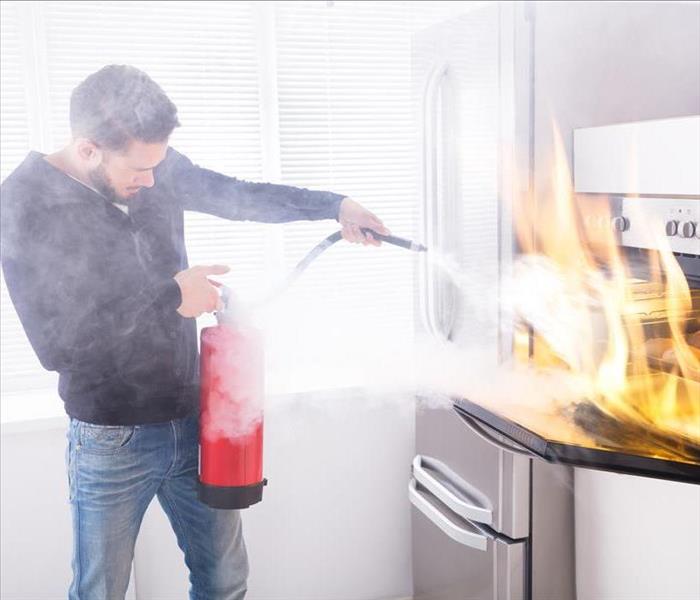How To Safely Extinguish a Grease Fire
10/14/2021 (Permalink)
The grease fire is one of the most common causes of fire and smoke damage in West Valley City, UT, homes, and kitchens. There are a couple of ways that grease-fueled fires get started: leave hot oil on the stovetop unattended and heating oil beyond its recommended temperature. These fires may also start if the heated grease overflows the pot or pan.
How To Respond to a Grease Fire
Your first step in avoiding a kitchen fire is to remain in the kitchen at all times when you have oil or grease on the stovetop. This precaution is appropriate when you're cooking any type of meat, such as bacon or hamburger, that releases juices. Another great tip for avoiding kitchen fires is keeping the stovetop and oven clean and free of crumbs, animal fats, and other foods. Keep flammable items, such as hot pads, towels, and cookbooks away from sources of heat; instead, keep the pan lid, a fire extinguisher, and baking soda or salt within reach.
Common Mistakes To Avoid
You can't handle a grease fire the same way you approach other types of fire. In fact, some of the first things you would do to put out other types of fire can increase the risk of harm and damage when dealing with grease. Here are some tips about common mistakes:
- Never throw water on grease, oil, or fat-caused fires. Adding water to an already dangerous fire will dramatically increase the danger and cause flames and oil to splatter.
- Do not move the pot. Too often, this movement causes the burning oil to splash and the fire to spread.
- Don't use towels or other flammable materials to smother the fire. You may have a damp cloth or a towel handy, but these materials will cause the fire to spread.
- Don't use flour or sugar on the flames. Baking soda and salt are the only baking products you can safely use to put out the fire.
With the "do not" list out of the way, it's time to focus on the things you can do to quickly extinguish the fire.
Safe Ways To Put Out the Fire
- In a best-case scenario, you will be on hand to recognize that your heated oil is starting to smoke. At the first sign of trouble, turn off the heat to your pot or pan. This may be enough to prevent flames and spitting.
- If you have your metal lid close by, you can use it to cover the pot. The lack of oxygen will put out the fire.
- A #10 can, such as a large coffee can, full of baking soda or salt can be used to smother grease-fueled fires. Bear in mind that it takes a lot of soda or salt to put out the flames.
- Use a fire extinguisher if you can't get close enough to use one of these tactics, a fire extinguisher is another good option. You should have a Class B dry chemical fire extinguisher on hand. The wrong extinguisher, such as a water-based Class A, can make the fire worse.
A grease fire can be very dangerous. Use these tips to avoid damage, and then turn fire cleanup over to trained fire damage cleanup professionals.






 24/7 Emergency Service
24/7 Emergency Service
